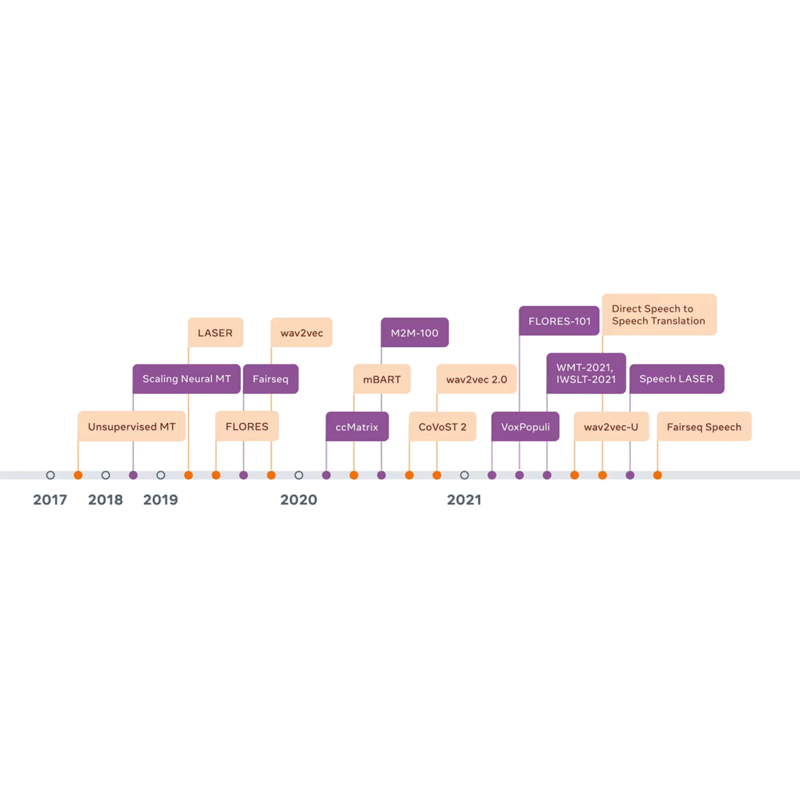
Billions of people live on Earth, living side-by-side, speaking thousands of languages.
Meta, the company that was born out of a Facebook rebrand, wants to understand anyone, anywhere, no matter what language they speak. There are lots of translators apps and software out there, but Meta wants to go beyond that, simply because it can.
To do this, Meta wants to use artificial intelligence to power a universal, instantaneous speech translator, capable of translating any language to any other language — including languages that are primarily spoken.
Founder and CEO Mark Zuckerberg announced this during an AI-focused event, describing it as a key step toward its push in creating the so-called metaverse.
"The ability to communicate with anyone in any language — that’s a superpower people have dreamed of forever, and AI is going to deliver that in our lifetimes," he said.
"This is going to be especially important when people begin teleporting across virtual worlds and experiencing things with people from different backgrounds."
The difference between Facebook posts and what happens inside the metaverse is that, posts don't require real-time translation, whereas on the metaverse, verbal communication is all that matters.
To ensure that its potential billions of people can communicate and engage in this future internet, Meta wants users to be able to use this universal translator whenever they need.
To make this happen, AI researchers working for Meta approach the problem in two ways.
First, they started building an AI called 'No Language Left Behind.'
The AI is build and designed to learn new languages with less training data than existing AI-powered translators.
In one example, Meta said that it is able to make the model capable of easily understanding languages like Luganta, a language spoken by an estimated 2 million people in Uganda.
Second, the researchers at the company create 'Universal Speech Translator.'
This project aims to build a system that can translate speech from one language directly to speech in another language without first transcribing it.
In other words, the AI is meant to be a real-time translator that can work without the needs for a written component to serve as its intermediary.
If everything goes as planned, Meta wants to make use of this advancement to benefit its globe-spanning products, furthering their reach.

A number of big tech companies, from Google to Apple, have AI translation tools available for their users.
While the tools are certainly useful, the underlying technologies have issues, in which the AIs they use can miss nuances for human speakers, and can add gendered biases, among other errors.
One example of this, happened back in 2017.
At that time, a Palestinian man was arrested by Israeli police after Facebook’s machine translation AI mistranslated a post he shared.
The man wrote "good morning" in Arabic, but Facebook translated this as "hurt them" in English and "attack them" in Hebrew.
Meta is the owner of Facebook, Messenger, Instagram, WhatsApp and Oculus.
In a blog post announcing the news, Meta researchers did not offer a timeframe for completing these projects or even a roadmap for major milestones in reaching their goal. Instead, the company stressed the utopian possibilities of universal language translation.
"Eliminating language barriers would be profound, making it possible for billions of people to access information online in their native or preferred language," the researchers said in a blog post.
"Advances in [machine translation] won’t just help those people who don’t speak one of the languages that dominates the internet today; they’ll also fundamentally change the way people in the world connect and share ideas."
"If No Language Left Behind and Universal Speech Translator, combined with the efforts of the MT research community, succeed in creating translation technologies that include everyone in the world, it will open up the digital and physical worlds in ways previously not possible."
Meta open sourced the technology on July 2022, in order to make the AI accessible to more people and developers.